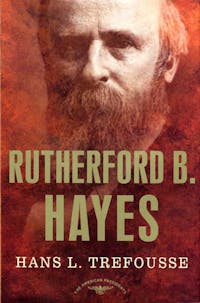Rutherford B. Hayes
The American Presidents Series: The 19th President, 1877-1881
 Download image
Download image
ISBN10: 0805069089
ISBN13: 9780805069082
Hardcover
192 Pages
$35.00
CA$49.00
If Rutherford B. Hayes's significance as chief executive had faded in the public memory, nothing brought it back into our consciousness more than the similarities between the controversial elections of 1876 and 2000. In 1876, Hayes's opponent, Samuel Tilden, won the popular vote and led the Electoral College, but the returns in several states were in dispute. A special electoral commission convened and handed the presidency to Hayes. Newspapers of the time cried of "the iniquity in Florida." Yet this cry of foul was only one of several obstacles facing the new president.
After years of Grant-era corruption, the Republican party looked to the earnest and upright Hayes to revitalize their flagging and scandalized party. As the volume of protest over election results increased, the Southern Democrats threatened to oust Hayes, and so he was forced to conciliate. To the dismay of the more conservative Republicans, he struck a deal to end military occupation of the South, thus ending the Reconstruction. In retrospect, as historian Hans L. Trefousse points out, it was this decision that helped unify the country and which restored legitimacy to the Oval Office.
As chief executive, Hayes's accomplishments were mixed. His conservative financial policies helped lift the country's economic depression, and he was able to reform the civil service and quell the 1877 labor uprising. But many of his well-intentioned goals, such as a bill that would help fund education for black children, were never realized, and many contemporary historians fault him for his lack of action on these fronts.
Rather than pursue a second term, Hayes decided to retire, maintaining his reputation for temperance, authority, and stability. Ultimately, it was Hayes's ability to compromise in order to help revitalize a floundering and factionalized nation that serves as his real legacy.
Reviews
Praise for Rutherford B. Hayes
"Rutherford B. Hayes's presidency is fascinating for modern readers because of the similarity of his election to that of Presidency George W. Bush. In 1876, as in 2000, the disputed result of the presidential canvass hinged on the question of votes denied to African Americans. When it was finally settled in favor of Hayes, his democratic opponents remained dissatisfied. Hayes, however, managed to steer a middle course throughout his administration, thus reconciling the country to his assumption of power and succeeding in helping the Republicans to win the election of his successor. Highly educated and of great integrity, admitted even by his opponents, he can serve as model to successors facing similar problems."—Hans L. Trefousse on Rutherford B. Hayes
"[A] thoughtful [and] useful look at an honest, if obscure, political leader, who, the author argues, rightfully won his office . . . Trefousse shows Hayes was free of many of the prejudices of his day, mild-mannered and pleasant to those around him—perhaps not the making of a legendary character, but certainly a steadying influence in a tumultuous time."—Kirkus Reviews
"The American Presidents series offers fresh, concise portraits of the U.S. chief executives. One of the most valuable services of the series is paying attention to 'overlooked' presidents. This series entry on the nineteenth president rescues from relative obscurity a man who, in the eyes of the author, a specialist in the Civil War and Reconstruction, should be remembered. Hayes served in Congress, as governor of Ohio, and as a general in the Civil War before his election to the presidency in 1876. It is this election for which he is chiefly remembered, for he is one of only four presidents who have won the electoral vote but not the popular vote. It was to Hayes' credit as an honest and conciliatory man, moderate in thought and action, that he was able to overcome the notion that he was a 'fraudulent' president. A fluid and valuable overview."—Brad Hooper, Booklist
"Like our current chief executive, Rutherford B. Hayes (1822-1893) came to power after a disputed election in 1876, arbitrated by a special congressional electoral commission that handed him the office and left him tarred as 'the fraudulent president' for the rest of his term. Trefousse, a history professor emeritus at the City University of New York and biographer of Andrew Johnson, offers a straightforward, by-the-numbers life . . . that hurries through Hayes's days as an eager student at Kenyon College and Harvard Law School to focus on his Ohio governorship and his single term as president. Hayes effectively ended Reconstruction, withdrawing federal troops and Republican regimes from the South to make way for the Democrats—a controversial move that spelled the end of black rights in the South, though Trefousse argues that Hayes had little choice and the best of intentions in terms of protecting blacks . . . A concise, informative account."—Publishers Weekly
Reviews from Goodreads
BOOK EXCERPTS
Read an Excerpt
Listen to an Excerpt from the Audiobook
Download MP3MEDIA
Watch
Rutherford B. Hayes by Hans L. Trefousse--Audiobook Excerpt
Listen to this audiobook excerpt from Hans L. Trefousse's biography Rutherford B. Hayes, part of The American Presidents Series. Hayes was a leader of the Reconstruction era, whose contested election eerily parallels the election debacle of 2000. The disputed election of 1876 between Rutherford B. Hayes and Samuel Tilden, in which Congress set up a special electoral commission, handing the disputed electoral votes to Hayes, brings recent events into sharp focus.
Share This


